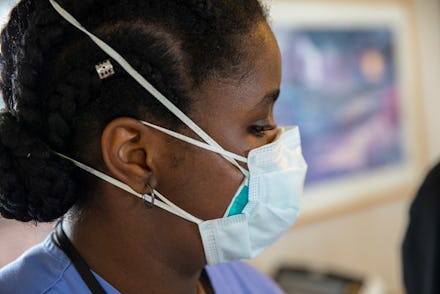This new, more protective mask could prevent PPE shortages for healthcare workers

As we navigate this new wave of coronavirus infections, we are also, once again, facing a shortage of PPE. During the holidays, it’s more important than ever that we all mask up in order to protect each other — especially the healthcare workers who will spend their holidays fighting the pandemic. Many of us have been relying on cloth masks that don’t provide as much protection as highly coveted N95s, but these new face masks may be an accessible alternative.
Honeywell International and other companies that make PPE have been racing to produce as many N95 masks as possible in order to meet the increasing needs of the health care workers and others who face the greatest risk of infection, the Wall Street Journal reported. Unfortunately, many of these masks have been bought up privately and never make it to the front lines. Now companies are also making masks for the general public. These new masks aim to combine the comfort of a cloth mask with close to N95 protection.
Honeywell’s new mask has two layers of polyester, nylon, and spandex woven together and comes with 12 replaceable filters made out of polypropylene and offers protection near that of an N95. This mask is available now for $30 from Honeywell.
Smaller companies, like ThermoPore, a plastics manufacturer, also see the urgent need for reusable consumer PPE and are trying to meet it as quickly as possible without creating a shortage of the materials needed to produce medical grade PPE, like propylene. In September, ThermoPore got government approval to make a new type of N95 that utilizes a different filtration material than polypropylene. Unfortunately, there's no word on when the mask will be available to the public. “I wish we could bring it to more people faster,” ThermoPore president Ken Milam told WSJ.
The exact protection level offered by consumer grade masks is not clear, as the federal certification process for N95 grade masks is long and there isn’t consensus on how to test consumer grade masks, according to Wall Street Journal. Regardless, these new masks are being designed to offer more protection than homemade cloth masks and use much of the same technology that the companies use to manufacture N95s.
Making sure that individuals have high quality personal protection is crucial to curbing the spread of the virus, and hopefully adding some more effective options to the market will prevent individuals from buying up N95 masks that those working on the front lines need.